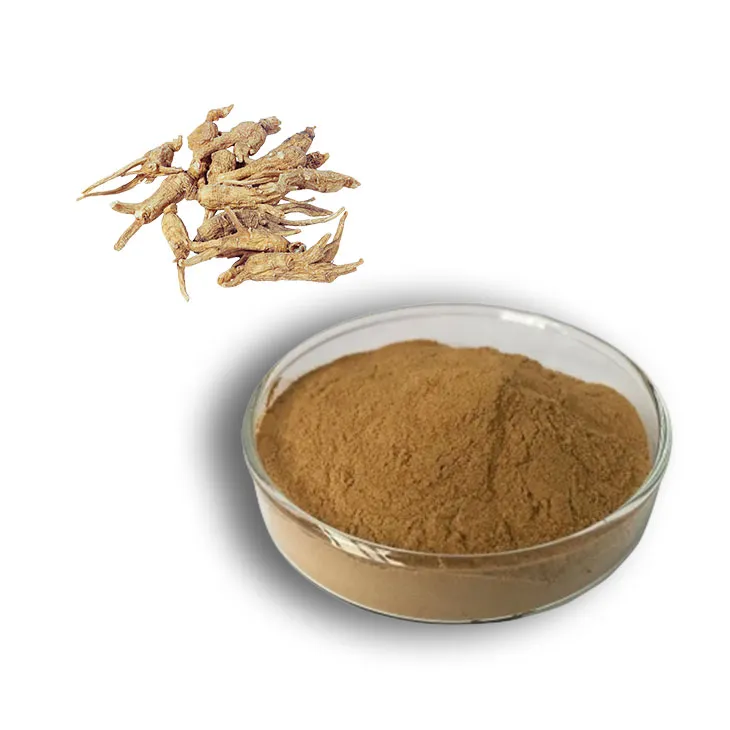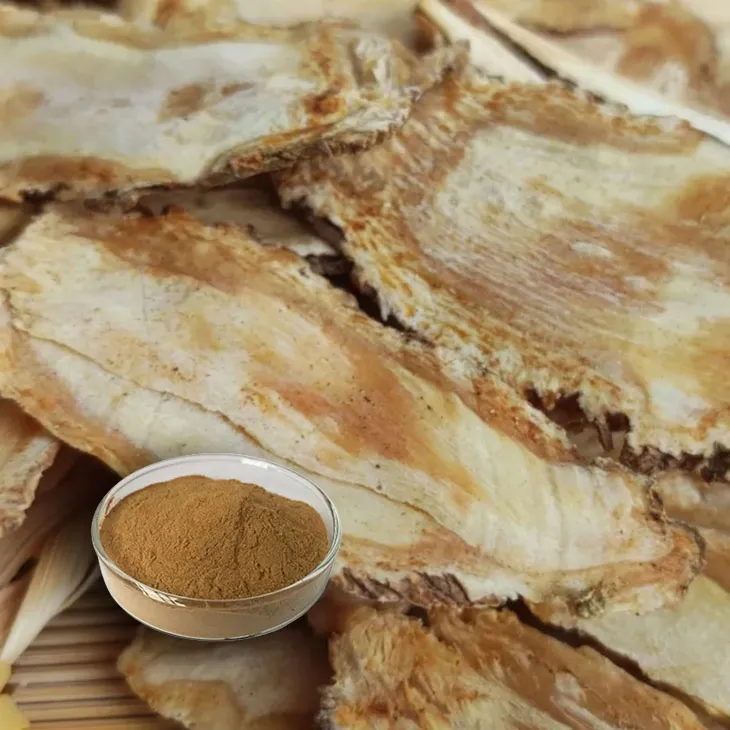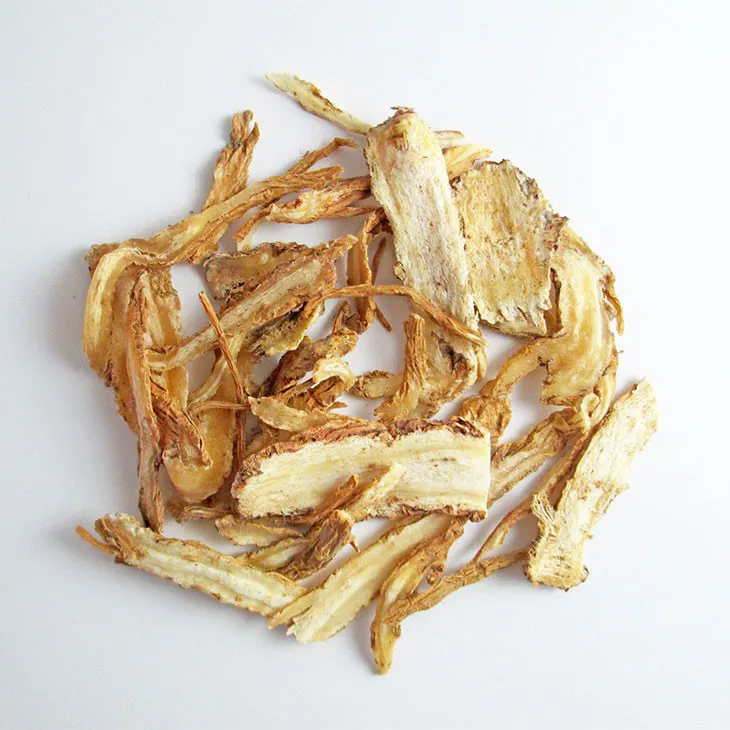- 0086-571-85302990
- sales@greenskybio.com
Angelica sinensis Extract: Benefits, Uses and Possible Side Effects
2024-11-13

1. Introduction
Angelica sinensis, also known as Dong Quai, is a herbaceous perennial plant native to China. For centuries, its root has been used in traditional Chinese medicine (TCM). The Angelica sinensis extract is obtained from the dried root of this plant and has gained significant attention in recent years due to its potential health benefits. This article aims to provide a comprehensive understanding of the benefits, uses, and possible side effects of Angelica sinensis extract.

2. Benefits of Angelica sinensis extract
2.1. Menstrual Health
One of the most well - known benefits of Angelica sinensis extract is its positive impact on menstrual health. In TCM, it has long been used to regulate menstrual cycles. It can help relieve menstrual cramps, reduce pre - menstrual syndrome (PMS) symptoms such as mood swings, bloating, and breast tenderness, and may also be beneficial for women with irregular menstrual periods.
Studies have suggested that the extract may act on the hormonal system, potentially influencing estrogen levels in a way that promotes a more regular menstrual cycle. However, more research is needed to fully understand the underlying mechanisms.
2.2. Cardiovascular Health
Angelica sinensis extract may also have positive effects on cardiovascular health. It has been shown to have anti - platelet and anti - coagulant properties, which can help prevent the formation of blood clots in the arteries. This, in turn, may reduce the risk of heart attacks and strokes.
Furthermore, the extract may help lower blood pressure. Some components in the extract are believed to relax blood vessels, allowing for better blood flow and reducing the pressure on the arterial walls. However, individuals with existing cardiovascular conditions should consult their healthcare providers before using Angelica sinensis extract as a complementary treatment.
2.3. Anti - Inflammatory and Analgesic Effects
The extract has demonstrated anti - inflammatory and analgesic (pain - relieving) properties. It may be useful in treating various inflammatory conditions such as arthritis. In animal studies, Angelica sinensis extract has been shown to reduce inflammation in the joints, and some preliminary human studies have also suggested potential benefits for individuals with arthritis - related pain.
The exact mechanisms behind these effects are not fully understood, but it is thought that certain compounds in the extract may inhibit the production of inflammatory mediators in the body.
2.4. Skin Health
Angelica sinensis extract can also contribute to skin health. It contains antioxidants that can help protect the skin from damage caused by free radicals. Free radicals are unstable molecules that can damage skin cells, leading to premature aging, wrinkles, and dull skin.
The extract may also have a role in promoting wound healing. Some studies have shown that it can stimulate the growth of skin cells and improve the quality of the newly formed tissue. Additionally, it may be beneficial for certain skin conditions such as eczema and psoriasis, although more research is required in this area.
2.5. Immune System Support
There is evidence to suggest that Angelica sinensis extract can support the immune system. It contains various bioactive compounds that may enhance the function of immune cells. For example, it may stimulate the activity of macrophages, which are cells that play a crucial role in the body's defense against pathogens.
By strengthening the immune system, the extract may help the body better resist infections and diseases. However, it should not be considered a substitute for a healthy lifestyle, including a balanced diet, regular exercise, and proper hygiene.

3. Uses of Angelica Sinensis Extract
3.1. In Traditional Chinese Medicine
In TCM, Angelica sinensis is a key ingredient in many herbal formulas. It is often combined with other herbs to treat a wide range of conditions. For example, it may be used in formulas for promoting blood circulation, treating gynecological disorders, and relieving pain.
TCM practitioners use different preparation methods for Angelica sinensis, such as decoction (boiling the root in water to make a tea - like infusion), tincture (extracting the active compounds in alcohol), and powder forms. The specific preparation and combination with other herbs depend on the patient's condition and the overall treatment approach.
3.2. In Dietary Supplements
Angelica sinensis extract is increasingly available as a dietary supplement in many countries. These supplements are often promoted for their potential health benefits, especially for women's health. They are available in various forms, including capsules, tablets, and liquid extracts.
However, it is important to note that the quality and potency of dietary supplements can vary widely. Consumers should choose products from reputable manufacturers and follow the recommended dosage instructions.
3.3. In Cosmetics
Due to its potential benefits for skin health, Angelica sinensis extract is also used in the cosmetics industry. It can be found in products such as creams, lotions, and serums. These products are marketed for their anti - aging, skin - soothing, and wound - healing properties.
When using cosmetics containing Angelica sinensis extract, it is important to perform a patch test first, especially for individuals with sensitive skin, to ensure there are no adverse reactions.

4. Possible Side Effects of Angelica Sinensis Extract
4.1. Allergic Reactions
Some individuals may be allergic to Angelica sinensis extract. Allergic reactions can range from mild symptoms such as skin rashes, itching, and hives to more severe reactions such as difficulty breathing and anaphylactic shock. People with a known allergy to plants in the Apiaceae family (which includes Angelica sinensis) should avoid using the extract.
If any signs of an allergic reaction occur after using the extract, immediate medical attention should be sought.
4.2. Hormonal Effects
As mentioned earlier, Angelica sinensis extract may have an impact on hormonal levels, particularly estrogen. While this can be beneficial for some women in terms of menstrual health, it may also pose risks for certain individuals. For example, women with estrogen - sensitive breast cancer or other hormonal - related conditions should be cautious when using the extract, as it may potentially interfere with their existing treatment or exacerbate their condition.
It is essential for these individuals to consult their healthcare providers before using Angelica sinensis extract.
4.3. Gastrointestinal Disturbances
Some people may experience gastrointestinal disturbances after taking Angelica sinensis extract. These can include nausea, vomiting, diarrhea, and abdominal pain. These symptoms may be more likely to occur if the extract is taken in large doses or on an empty stomach.
To minimize the risk of gastrointestinal side effects, it is recommended to start with a low dose and gradually increase if necessary, and to take the extract with food.
4.4. Drug Interactions
Angelica sinensis extract may interact with certain medications. For example, it may potentiate the effects of anti - coagulant and anti - platelet drugs, increasing the risk of bleeding. It may also interact with drugs that are metabolized by the liver, potentially affecting their efficacy or increasing the risk of side effects.
If you are taking any medications, it is crucial to inform your healthcare provider before using Angelica sinensis extract to avoid potential drug interactions.
5. Conclusion
Angelica sinensis extract offers a range of potential benefits, from improving menstrual health to supporting cardiovascular health and skin health. It has various uses in traditional medicine, dietary supplements, and cosmetics. However, it is not without potential side effects, and caution should be exercised, especially for those with pre - existing health conditions or those taking medications.
Further research is needed to fully understand the mechanisms of action of the extract and to determine its long - term safety and efficacy. Overall, when considering the use of Angelica sinensis extract, it is advisable to consult a healthcare professional to ensure its appropriate and safe use.
FAQ:
What are the main benefits of Angelica Sinensis extract?
Angelica Sinensis extract has several benefits. It is often associated with promoting blood circulation, which can be beneficial for menstrual regulation in women, helping to relieve menstrual cramps and irregularities. It also has antioxidant properties that can help protect cells from damage caused by free radicals. Additionally, it may have anti - inflammatory effects, potentially being useful in treating certain inflammatory conditions.
How is Angelica Sinensis extract used?
It can be used in various ways. In traditional medicine, it is often made into decoctions or tinctures. In modern applications, it may be included in dietary supplements in the form of capsules or tablets. Some skincare products may also contain Angelica Sinensis extract for its potential benefits in promoting skin health, such as improving skin complexion and reducing signs of aging.
Are there any potential side effects of Angelica Sinensis extract?
Yes, there can be potential side effects. Some people may experience allergic reactions to it, which can manifest as skin rashes, itching, or swelling. In large doses, it may cause digestive issues like nausea, vomiting, or diarrhea. Also, it may interact with certain medications, so it is important to consult a healthcare provider before using it, especially if one is taking other drugs.
Can Angelica Sinensis extract be used during pregnancy?
Using Angelica Sinensis extract during pregnancy is generally not recommended. It has properties that can affect the uterus, such as promoting blood circulation, which may pose risks to the developing fetus. Pregnant women should always consult their healthcare providers before using any herbal products.
How does Angelica Sinensis extract promote blood circulation?
Angelica Sinensis extract contains various bioactive compounds. Some of these compounds may act on the blood vessels, causing them to dilate. This dilation can improve blood flow throughout the body. Additionally, it may have an impact on platelet aggregation, reducing the likelihood of blood clots and further enhancing circulation.
Related literature
- Beneficial Effects of Angelica Sinensis in Health and Disease"
- "Angelica Sinensis Extract: A Review of Its Pharmacological Properties"
- "The Use and Safety of Angelica Sinensis in Traditional and Modern Medicine"
- ▶ Hesperidin
- ▶ citrus bioflavonoids
- ▶ plant extract
- ▶ lycopene
- ▶ Diosmin
- ▶ Grape seed extract
- ▶ Sea buckthorn Juice Powder
- ▶ Beetroot powder
- ▶ Hops Extract
- ▶ Artichoke Extract
- ▶ Reishi mushroom extract
- ▶ Astaxanthin
- ▶ Green Tea Extract
- ▶ Curcumin Extract
- ▶ Horse Chestnut Extract
- ▶ Other Problems
- ▶ Boswellia Serrata Extract
- ▶ Resveratrol Extract
- ▶ Marigold Extract
- ▶ Grape Leaf Extract
- ▶ blog3
- ▶ blog4
- ▶ blog5
-
Organic Tongkat Ali extract powder factory.
2024-11-13
-
How to make powder with ashwagandha extract.
2024-11-13
-
Rosehip extract manufacturers from China.
2024-11-13
-
The best cat's claw extract in nature.
2024-11-13
-
Chinese Dandelion Leaf Extract Suppliers.
2024-11-13
-
Fenugreek Extract Powder
2024-11-13
-
Dan Shen Root Extract/Salvia Root Extract
2024-11-13
-
Sugarcane Extract
2024-11-13
-
Curcuma Longa Extract
2024-11-13
-
Nutmeg Extract
2024-11-13
-
Agaricus Blazei Extract
2024-11-13
-
Licorice Root Extract Powder
2024-11-13
-
Tormentil Extract
2024-11-13
-
Ivy Extract
2024-11-13
-
Golden Seal Extract
2024-11-13





















